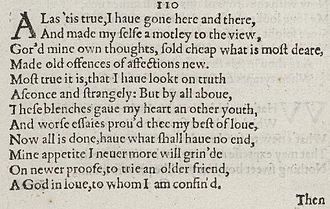Sonnet 110
Q1
Q2
Q3
C
Alas, ’tis true I have gone here and there,
And made myself a motley to the view,
Gor’d mine own thoughts, sold cheap what is most dear,
Made old offences of affections new;
Most true it is that I have look’d on truth
Askance and strangely: but, by all above,
These blenches gave my heart another youth,
And worse essays prov’d thee my best of love.
Now all is done, have what shall have no end:
Mine appetite I never more will grind
On newer proof, to try an older friend,
A god in love, to whom I am confin’d.
Then give me welcome, next my heaven the best,
Even to thy pure and most most loving breast.
4
8
12
14
Sonnet 110 is one of 154 sonnets written by the English playwright and poet William Shakespeare. Sonnet 110 was published along with the other sonnets in the 1609 Quarto. The sonnet falls in place with the Fair Youth sequence of Shakespeare's sonnets, in which the poet expresses his love towards a young man. The mystery of the young man is still unknown today. However, there are many different theories by various scholars of who this young man may be. There has been much debate whether or not this sonnet was written about Shakespeare's disdain with the stage and actors. Whereas others have interpreted sonnet 110 as the poet confessing his love to a young man.
The sonnet is a confession of the poets committed sins and promiscuity, which quickly escalates to his confession of love to the young man. With Shakespeare's heavy use of double meanings to words have scholars perplexed as to whether the sonnet is about Shakespeare's career as an actor or a confession of love to the young man. The sonnet is written in traditional Shakespearean sonnet form consisting of 14 lines with Iambic Pentameter and ending with a couplet.
The poet confesses to profligate and dishonest behaviour, but these faults have revitalised him. He will no longer look elsewhere but devote himself to the young man, who he hopes will welcome him back.
Below is scholar David West's paraphrase translated to modern English:
It's true. I have ranged widely, made myself a fool, squandered my treasure, and hurt my old lover by taking a new. I have truly given truth a sideways glance, but I swear this brought youth back to my heart. Experiment proved that you are the best that love has to offer. It is ended. Take what will not end. Never again will I whet my appetite on new loves to test the old, my one and only god of love. You are next to my heaven. Take me back to your pure and loving breast.
...
Wikipedia

